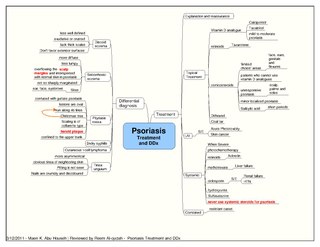Related Research Articles

Psoriasis is a long-lasting,noncontagious autoimmune disease characterized by patches of abnormal skin. These areas are red,pink,or purple,dry,itchy,and scaly. Psoriasis varies in severity from small localized patches to complete body coverage. Injury to the skin can trigger psoriatic skin changes at that spot,which is known as the Koebner phenomenon.

Psoriatic arthritis (PsA) is a long-term inflammatory arthritis that occurs in people affected by the autoimmune disease psoriasis. The classic feature of psoriatic arthritis is swelling of entire fingers and toes with a sausage-like appearance. This often happens in association with changes to the nails such as small depressions in the nail (pitting),thickening of the nails,and detachment of the nail from the nailbed. Skin changes consistent with psoriasis frequently occur before the onset of psoriatic arthritis but psoriatic arthritis can precede the rash in 15% of affected individuals. It is classified as a type of seronegative spondyloarthropathy.

Alopecia universalis(AU),also known as alopecia areata universalis,is a medical condition involving the loss of all body hair,including eyebrows,eyelashes,chest hair,armpit hair,and pubic hair. It is the most severe form of alopecia areata. People with the disease are usually healthy and have no other symptoms and a normal life expectancy.

Onychomycosis,also known as tinea unguium,is a fungal infection of the nail. Symptoms may include white or yellow nail discoloration,thickening of the nail,and separation of the nail from the nail bed. Fingernails may be affected,but it is more common for toenails. Complications may include cellulitis of the lower leg. A number of different types of fungus can cause onychomycosis,including dermatophytes and Fusarium. Risk factors include athlete's foot,other nail diseases,exposure to someone with the condition,peripheral vascular disease,and poor immune function. The diagnosis is generally suspected based on the appearance and confirmed by laboratory testing.
Alefacept is a genetically engineered immunosuppressive drug. It was sold under the brand name Amevive in Canada,the United States,Israel,Switzerland and Australia. In 2011,the manufacturers made a decision to cease promotion,manufacturing,distribution and sales of Amevive during a supply disruption. According to Astellas Pharma US,Inc.,the decision to cease Amevive sales was neither the result of any specific safety concern nor the result of any FDA-mandated or voluntary product recall. On the other hand,usage of Amevive was associated with a certain risk of development systemic diseases such as malignancies. This drug was never approved for the European drug market.
A TNF inhibitor is a pharmaceutical drug that suppresses the physiologic response to tumor necrosis factor (TNF),which is part of the inflammatory response. TNF is involved in autoimmune and immune-mediated disorders such as rheumatoid arthritis,ankylosing spondylitis,inflammatory bowel disease,psoriasis,hidradenitis suppurativa and refractory asthma,so TNF inhibitors may be used in their treatment. The important side effects of TNF inhibitors include lymphomas,infections,congestive heart failure,demyelinating disease,a lupus-like syndrome,induction of auto-antibodies,injection site reactions,and systemic side effects.

The National Psoriasis Foundation (NPF) is one of the world's largest nonprofit organization serving people with psoriasis and psoriatic arthritis. The NPF provides information and services to help people manage their condition while supporting research to find a cure. In addition to serving more than 3 million people annually through patient and professional health education and advocacy initiatives,the NPF has funded more than $10 million in psoriatic disease research grants and fellowships.
Ustekinumab, sold under the brand name Stelara among others,is a monoclonal antibody medication developed by Janssen Pharmaceuticals,for the treatment of Crohn's disease,ulcerative colitis,plaque psoriasis and psoriatic arthritis,targeting both IL-12 and IL-23.

Arthritis mutilans is a rare medical condition involving severe inflammation damaging the joints of the hands and feet,and resulting in deformation and problems with moving the affected areas;it can also affect the spine. As an uncommon arthropathy,arthritis mutilans was originally described as affecting the hands,feet,fingers,and/or toes,but can refer in general to severe derangement of any joint damaged by arthropathy. First described in modern medical literature by Marie and Leri in 1913,in the hands,arthritis mutilans is also known as opera glass hand,or chronic absorptive arthritis. Sometimes there is foot involvement in which toes shorten and on which painful calluses develop in a condition known as opera glass foot,or pied en lorgnette.

Psoriatic onychodystrophy or psoriatic nails is a nail disease. It is common in those with psoriasis,with reported incidences varying from 10% to 78%. Elderly patients and those with psoriatic arthritis are more likely to have psoriatic nails.

Psoriatic erythroderma represents a form of psoriasis that affects all body sites,including the face,hands,feet,nails,trunk,and extremities. This specific form of psoriasis affects 3 percent of persons diagnosed with psoriasis. First-line treatments for psoriatic erythroderma include immunosuppressive medications such as methotrexate,acitretin,or ciclosporin.

Tofacitinib,sold under the brand Xeljanz among others,is a medication used to treat rheumatoid arthritis,psoriatic arthritis,ankylosing spondylitis,polyarticular course juvenile idiopathic arthritis,and ulcerative colitis. It is a janus kinase (JAK) inhibitor,discovered and developed by the National Institutes of Health and Pfizer.
Ixekizumab,sold under the brand name Taltz,is an injectable medication for the treatment of autoimmune diseases. Chemically,it is a form of a humanized monoclonal antibody. The substance acts by binding interleukin 17A and neutralizing it,reducing inflammation.

Secukinumab,sold under the brand name Cosentyx among others,is a human IgG1κmonoclonal antibody used for the treatment of psoriasis,ankylosing spondylitis,and psoriatic arthritis. It binds to the protein interleukin (IL)-17A and is marketed by Novartis.
Goeckerman therapy is a regimen for treatment of moderate to severe plaque psoriasis using a combination of crude coal tar and artificial ultraviolet radiation. It is a specialized form of light therapy.
Mark G. Lebwohl is an American dermatologist and author who is Professor and Chairman Emeritus of the Kimberly and Eric J. Waldman Department of Dermatology and the Dean for Clinical Therapeutics at the Icahn School of Medicine at Mount Sinai in New York City.

Apremilast,sold under the brand name Otezla among others,is a medication for the treatment of certain types of psoriasis and psoriatic arthritis. The drug acts as a selective inhibitor of the enzyme phosphodiesterase 4 (PDE4) and inhibits spontaneous production of TNF-alpha from human rheumatoid synovial cells. It is taken by mouth.
Guselkumab,sold under the brand name Tremfya,is a monoclonal antibody against interleukin-23 used for the treatment of plaque psoriasis.
Nicholas J Lowe is an English dermatologist who has published research into skin pharmacology,botulinum toxins,injectable filler and Lasers in cutaneous and cosmetic Surgery.
Nehal N. Mehta,is an American cardiologist at the National Heart,Lung,and Blood Institute (NHLBI) in Bethesda,Maryland where he studies the role of innate immunity and inflammation in the development of cardiovascular and metabolic diseases.
References
- ↑ "Joel Gelfand". Perelman School of Medicine. University of Pennsylvania.
- ↑ Martin, Kari. "Phototherapy for Psoriasis in the Age of Biologics - Dialogues in Dermatology" (PDF). AAD.
- ↑ Gelfand, Joel (11 October 2006). "Risk of Myocardial Infarction in Patients With Psoriasis". JAMA. 296 (14): 1735–1741. doi:10.1001/jama.296.14.1735. PMID 17032986. S2CID 631378.
- 1 2 Koons, Samantha. "What We Are Learning About Psoriasis and Heart Disease". National Psoriasis Foundation. NPF. Retrieved 31 October 2022.
- ↑ "Joel Gelfand Scholar Profile". Google Scholar.
- ↑ Maymone, Mayra (July 2020). "Top authors in dermatology by h-index: A bibliometric analysis of 1980-2020". Journal of the American Academy of Dermatology. 83 (1): 201–205. doi: 10.1016/j.jaad.2019.06.1308 . PMID 31279031. S2CID 195819992.
- ↑ Szeto, Mindy (December 2021). "Top authors in dermatology by h-index: A bibliometric analysis of 1980-2020". Journal of the American Academy of Dermatology. 85 (6): 1573–1579. doi: 10.1016/j.jaad.2020.10.087 . PMID 33217507. S2CID 227102671.
- ↑ Love, Thorvardur (August 2012). "Obesity and the risk of psoriatic arthritis: a population-based study". Ann Rheum Dis. 71 (8): 1273–1277. doi:10.1136/annrheumdis-2012-201299. PMC 3645859 . PMID 22586165.
- ↑ Paddock, Catherine (16 November 2017). "Psoriasis severity may influence type 2 diabetes risk". MedicalNewsToday. Retrieved 31 October 2022.
- ↑ Rapaport, Lisa (10 November 2017). "Psoriasis tied to higher risk of serious liver disease". Reuters Health. Retrieved 31 October 2022.
- ↑ Jaslow, Ryan (7 August 2013). "Psoriasis may raise risk for diseases of heart, lungs, kidneys". CBS News. CBS. Retrieved 31 October 2022.
- ↑ Wan, Joy (October 15, 2013). "Risk of moderate to advanced kidney disease in patients with psoriasis: population based cohort study". BMJ. 347: f5961. doi:10.1136/bmj.f5961. PMC 3805477 . PMID 24129480.
- ↑ Ogdie, Alexis (February 2015). "Risk of major cardiovascular events in patients with psoriatic arthritis, psoriasis and rheumatoid arthritis: a population-based cohort study". Ann Rheum Dis. 74 (2): 326–332. doi:10.1136/annrheumdis-2014-205675. PMC 4341911 . PMID 25351522.
- ↑ Abuabara, K (19 August 2010). "Cause-specific mortality in patients with severe psoriasis: a population-based cohort study in the U.K." British Journal of Dermatology. 163 (3): 586–592. doi:10.1111/j.1365-2133.2010.09941.x. PMC 2966545 . PMID 20633008.
- ↑ Takeshita, Junko (March 2017). "Psoriasis and comorbid diseases: Epidemiology". Journal of the American Academy of Dermatology. 76 (3): 377–390. doi: 10.1016/j.jaad.2016.07.064 . PMC 5731650 . PMID 28212759.
- ↑ Noe, Megan (January 2022). "Evaluation of a Case Series of Patients With Palmoplantar Pustulosis in the United States". JAMA Dermatol. 158 (1): 68–72. doi:10.1001/jamadermatol.2021.4635. PMC 8655660 . PMID 34878495.
- ↑ Gelfand, Joel (October 2005). "Epidemiology of psoriatic arthritis in the population of the United States". Journal of the American Academy of Dermatology. 53 (4): 573. doi:10.1016/j.jaad.2005.03.046. PMID 16198775.
- ↑ Gelfand, Joel (Jan 2005). "The prevalence of psoriasis in African Americans: results from a population-based study". Journal of the American Academy of Dermatology. 52 (1): 23–26. doi:10.1016/j.jaad.2004.07.045. PMID 15627076.
- ↑ Frellick, Marcia. "Apremilast May Have Some Cardiometabolic Benefits in Patients With Psoriasis". Medscape. Retrieved 31 October 2022.
- ↑ "Comparing Home- Versus Clinic-Based Phototherapy for the Treatment of Psoriasis -- The LITE Study". PCORI. 26 September 2017.
- 1 2 3 4 5 6 7 "About". Gelfand Clinical Research Lab. University of Pennsylvania. Retrieved 31 October 2022.
- ↑ Salvaryn, Georgia. "Penn Medicine awards Joel M. Gelfand, MD, MSCE, the James J. Leyden Endowed Professorship". Healio. Retrieved 31 October 2022.
- ↑ "Profile". American Society for Clinical Investigation. Retrieved 31 October 2022.
- ↑ Infanti, John. "National Psoriasis Foundation honors two Penn dermatologists". EurekAlert. AAAS.